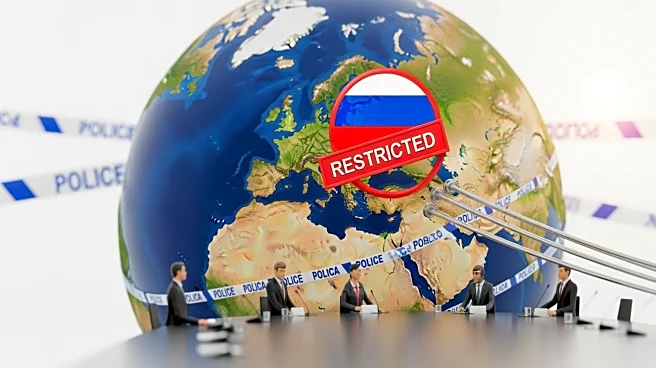What's Happening?
President Trump has implemented sanctions targeting Russian oil companies, Rosneft and Lukoil, which are expected to significantly impact European energy imports. These sanctions follow Trump's criticism of Europe for continuing to purchase energy from
Russia, which contributes substantially to the Kremlin's revenue. The sanctions are set to take effect by November 21, compelling European countries and companies to reconsider their energy transactions with Russia. The measures are already affecting companies like Finnish energy firm Neste, which has suspended fuel deliveries to Lukoil's subsidiary Teboil. The sanctions are anticipated to hurt Lukoil significantly, potentially forcing the company to sell stakes in overseas projects, affecting up to 20% of its revenue.
Why It's Important?
The sanctions imposed by President Trump are crucial as they aim to reduce the financial resources available to Russia, potentially impacting its military efforts in Ukraine. By targeting major Russian oil companies, the sanctions could disrupt global oil supply chains and lead to increased oil prices. European countries, which rely heavily on Russian energy, may face challenges in securing alternative energy sources, potentially leading to economic and political repercussions. The sanctions also underscore the U.S.'s influence in global energy markets and its ability to shape international trade policies.
What's Next?
As the sanctions take effect, European countries and companies will need to find alternative energy sources to replace Russian oil imports. This could lead to increased demand for oil from other regions, potentially driving up global oil prices. European governments may seek exemptions from the sanctions to mitigate economic impacts, while companies may explore workarounds to continue importing Russian oil. The situation may also prompt diplomatic negotiations between the U.S. and European nations to address the broader implications of the sanctions.
Beyond the Headlines
The sanctions highlight the geopolitical tensions between the U.S. and Russia, with energy trade serving as a critical leverage point. The move may influence future U.S. foreign policy decisions and impact international relations, particularly with European allies. Additionally, the sanctions could accelerate Europe's transition to renewable energy sources as countries seek to reduce dependency on Russian oil.















